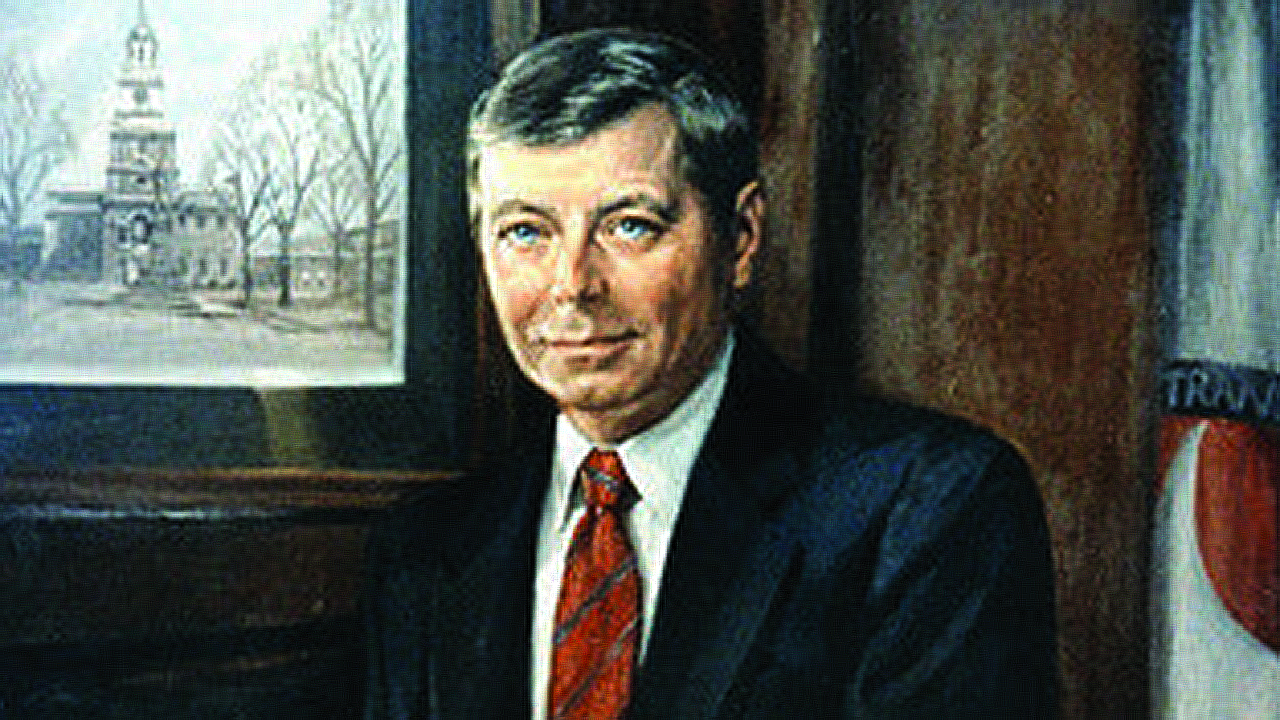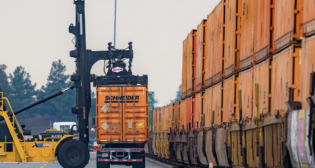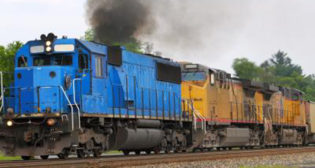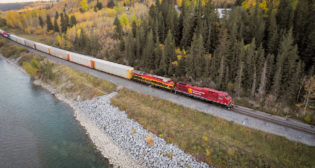
‘Shockah’: UP Pursues Self Interest
Written by Frank N. Wilner, Capitol Hill Contributing Editor
In 1995, when Congress reinvented the ICC as the STB, a Senate amendment to the legislation surfaced to shift rail merger approval authority to the Justice Department—speculation that it was intended to scuttle a planned UP-SP merger. UP Chairperson Drew Lewis, formerly Ronald Reagan’s Transportation Secretary, stood outside the Senate chamber the day of the Senate vote, shaking hands with senators as they entered the chamber, making clear through his presence (if not by whispers) UP’s opposition to the amendment. It was voted down, 62-35, with Business Week magazine reporting, “Lewis personally led UP’s legions of lobbyists.” U.S. Dept. of Transportation image
“Shockah” as they might say in “Bahsten” about Union Pacific’s (UP) May 3 federal court filing asking that the Surface Transportation Board’s (STB) approval of a Canadian Pacific-Kansas City Southern marriage creating CPKC be reviewed over UP concerns the merger will “reduce competition and negatively impact shippers.”
Is this the same UP that is so zealously fighting shipper efforts to increase competition by assuring a minimum of two-railroad competition (reciprocal switching, also known as competitive access) where prior mergers, including its own, have eliminated for shippers any effective transportation alternatives to the sole-serving railroad?
Is this the same UP that in 1996, in its own STB-approved consolidation with Southern Pacific (SP)—and post-merger during a service meltdown described by the Houston Chronicle as “the marriage from hell”—fiercely and successfully opposed STB imposition of track divestiture in and around Houston to cure a merger-created rail monopoly?
In defense of UP, the seeking of monopoly is an understandable human condition. It’s why we attend trade school, enroll in college, seek a graduate degree, arrive at work earlier, depart work later, and bring work home. And it is why firms innovate, invest in new technology and processes, and differentiate themselves by striving for excellence (or even seek government favors). It’s also why we have antitrust laws and expert regulatory commissions, such as the STB, to guard against market power abuse. In fact, not all monopolies are bad. The Supreme Court ruled in 1899 (Addyston Pipe and Steel v. U.S.) that large size and monopoly in themselves are not necessarily evil.
Four years before Congress created STB predecessor Interstate Commerce Commission (ICC) in 1887 to regulate railroad rates and practices, William H. Vanderbilt—who succeeded his father, Cornelius, as chairman of New York Central Railroad, and who also controlled Chicago & North Western and Delaware, Lackawanna & Western—was infamously quoted:
“The public be damned. What does the public care for the railroads except to get as much out of them for as small a consideration as possible? When we make a move we do it because it is our interest to do so, not because we expect to do somebody else some good. Railroads are not run on sentiment, but on business principles and to pay, and I don’t mean to be egotistic when I say that the roads which I have had anything to do with have generally paid pretty well.”
And in defense of Vanderbilt, a standard of success in the United States continues to be the making of money, evident in the quest for “more” not just by railroads, but also by wage earners, savings account holders, main street shop owners, and even rail shippers. Who better to quote than the most important figure in labor union history, Samuel Gompers, who said, “We do want more, and when it becomes more, we shall still want more. And we shall never cease to demand more until we have received the results of our labor.”
Whether concern over post-CPKCS-merger diversion of traffic is what piques UP can only be speculated. There may also be irritation—indignation—that UP’s lobbying and lawyering abilities have diminished, with the CPKC merger decision an uncommon poke in the eye to UP. There is evidence UP is unaccustomed to coming up short before Congress or regulators:
- In 1976, after the ICC approved a joint agreement between BNSF predecessor Burlington Northern and Chicago & North Western (C&NW, now part of UP) to construct a new 100-mile coal-hauling rail line out of Wyoming’s Powder River Basin, C&NW failed to obtain financing for its share of the project, so BN alone constructed the line with its own funds. UP, seeing a competitive opportunity, ponied-up the cash C&NW lacked, and successfully petitioned the ICC to resuscitate, over BN’s objections, the original joint operating agreement. To BN’s further dismay, C&NW partnered with UP in 1984 to poach from BN, over the track BN had previously constructed on its own, 100% of the coal hauling business of Arkansas Power & Electric.
- In 1995, when Congress reinvented the ICC as the STB, a Senate amendment to the legislation surfaced to shift rail merger approval authority to the Justice Department—speculation that it was intended to scuttle a planned UP-SP merger. UP Chairperson Drew Lewis, formerly Ronald Reagan’s Transportation Secretary, stood outside the Senate chamber the day of the Senate vote, shaking hands with senators as they entered the chamber, making clear through his presence (if not by whispers) UP’s opposition to the amendment. It was voted down, 62-35, with Business Week magazine reporting, “Lewis personally led UP’s legions of lobbyists.”
- When UP filed with the new STB its petition to acquire SP, shippers, facing loss of two-railroad competition, sought competitive-enhancing conditions requiring divestiture to BNSF, KCS and Tex-Mex of thousands of miles of UP-SP track. Post merger, nine of 11 tracks into Houston, for example, were owned by UP, while the two owned by BNSF lacked direct access to Houston shippers. The STB instead opted for track sharing (trackage rights). BNSF Chairperson Gerald Grinstein told Forbes magazine, “It’s quite different from owning your own track.” KCS CEO Mike Haverty told Traffic World magazine, “If you have ownership, you dispatch your own lines, you serve the customers, you have access to those customers and control of your own operations.”
- Adding to UP’s understandable assumptions of invincibility were the subsequent additions to its board of directors of President George W. Bush’s chief of staff, Andrew Card, and Bush’s vice president, Dick Cheney.
- UP also found a friend in STB Chairperson Linda J. Morgan, who had a long-time Senate staff relationship with UP Chief Lobbyist Mary McAuliffe. Although it is customary for Presidents to choose a member of their own political party as permanent STB chairperson, Republican Bush, upon taking office in January 2001, invited Democrat Morgan (Democratic President Bill Clinton’s choice to chair the STB) to remain as chairperson. Reported Traffic World, such “would be the doing” of UP Chairperson Dick Davidson and his predecessor, Drew Lewis.” UP’s McAuliffe told Traffic World, “We are making no secret of the fact that we want Linda to remain as chairperson.”
- UP had good reason to support Morgan. In reviewing 193 Morgan votes prior to Bush retaining her as chairperson, Traffic World reported that 82% of them favored UP—“regardless of whether the opponent was a shipper, a shipper association, a government agency, a labor union, another Class I railroad, or a smaller regional or short line railroad.” And in 37 cases where the choice was UP or another Class I railroad, Morgan voted in favor of UP 73% of the time. Where Morgan voted against UP, the impact was perceived as relatively small, or there was a larger UP benefit tucked within the decision, reported Traffic World.
- Morgan, after leaving the STB in 2003, found a new home—as UP’s Washington legal counsel. (In 2006, she was elected a Canadian Pacific board member. She died in 2015.)
In no other industry must individual firms work more harmoniously than railroads, yet in no other industry do individual firms so often bring legal actions against each other in defense of their own existing, budding or sought-after monopoly. As late 19th century New York politician and Tammany Hall operative George W. Plunkett offered, “I seen my opportunities and I took ‘em.”
And who, for another shockah, is to cast the first stone against one’s working for their own pocket? Certainly not any stockholder, any wage earner, any merchant nor any shipper. It ain’t personal. It’s business. And that shouldn’t be a “shockah.”

Railway Age Capitol Hill Contributing Editor Frank N. Wilner is a former assistant vice president for policy at the Association of American Railroads and a former STB chief of staff. Among his seven books are “Railroad Mergers: History, Analysis, Insight,” and the soon to be published, “Railroads & Economic Regulation.”



